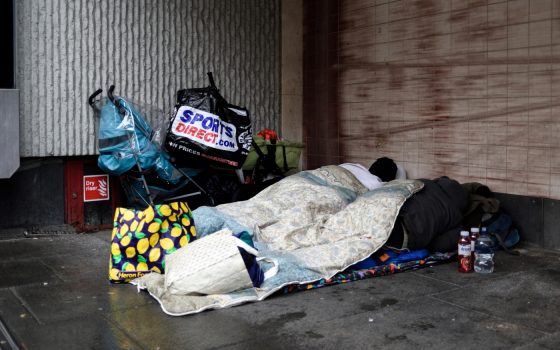The race class narrative: building a new narrative
We’re looking down the barrel of a cold, difficult winter. But some politicians want us to think the biggest threat facing the UK is the ‘wokemob’.
20 February 2023
This is an article from the fifth issue of the New Economics Zine. You can read the full issue here.
We are currently in the midst of the worst cost of living crisis of a generation, soaring energy bills, a climate crisis, a government that collapsed like a house of cards and moved onto the third prime minister this year. Yet, certain politicians, parts of the media and public figures will still have you believe that the biggest threat facing the United Kingdom is the scourge of the so called ‘wokemob’.
Look no further than the first Conservative leadership election earlier this year, where it became clear that the platform of choice for most candidates was a pushback against ‘wokery’. From Suella Braverman’s pledge to “get rid of all this woke rubbish” to accusations that Penny Mordaunt is “too woke” to be leader, it is evident that this will continue to be a focal point in British politics next year.
Meanwhile, over the past year, the Centre for Labour and Social Studies (CLASS) have been working in collaboration with ASO Communications on the UK Race-Class Narrative (RCN) project, which seeks to neutralise the divide and rule tactics used by certain sections of the right. The UK RCN uses methodology from the overwhelmingly successful American project, implemented during a number of US state elections and the 2020 Presidential Elections which tested seven progressive narratives, of which six registered more positively with the public than a Trumpian ‘opposition’ message.
Using a survey and innovative dial testing, we have spent the past year testing messages and collecting data on public attitudes towards topics related to race and class, using the Race Class Narrative method co-developed by ASO Communications. Unsurprisingly, our research found that this narrative of the ‘wokemob’ — though constructed by a relatively small section of hard-right politicians, parts of the media and very privileged public figures – has been remarkably successful.
Central to this story is the idea of the ‘traditional’ or ‘authentic’ white working class who have been left behind and who strive to uphold true British values against the yoke of political correctness enforced by the ‘wokemob’. The ‘wokemob’ are seen to favour undeserving minorities and immigrants over the white working class. Racial justice and equality are thus portrayed as a zero-sum game in which minorities and immigrants gain unfair privileges at the expense of everyone else. By pitting the white working class and the ‘wokemob‘ against each other in a false binary, the right has embroiled us in what they term the ‘culture war‘.
“By pitting the white working class and the ‘wokemob‘ against each other in a false binary, the right has embroiled us in what they term the ‘culture war‘.”
Through analysing the narrative landscape, the UK Race Class Narrative project found that this story is well understood, emotive, persuasive and effective in dividing persuadable working class people by race and ethnicity.
Many on the hard right genuinely subscribe to these beliefs, but they have also used this narrative to distract from the multitude of issues the UK faces today, whether it be the multiple scandals that have plagued the current government or the cost of living crisis. Our research found that only 10% of the public strongly share hard-right beliefs, while 60% actually have undecided or ‘persuadable‘ political views. And it is through this narrative of the ‘wokemob‘ that our opponents on the right have been so successful in gaining the support of the persuadables. By presenting the anti-woke story and a summation of the current progressive response to our participants, the UK RCN found the antiwoke story to be the decisive winner. Worse still, one in three people who took part in our research couldn’t even remember what the progressive response was immediately after hearing it, let alone decide whether they liked it.
In the face of such a dangerously effective narrative which shows no signs of abating, progressives are at best avoiding the issue and at worst legitimising it. From analysing communications, we found that progressive actors are falling into certain traps laid by our opponents. By echoing the sentiment that Britain is in the midst of a war of cultural values, we legitimise this dangerous theory. Meanwhile, by repeating their phrases in an attempt to refute them, we are unwittingly ingraining them further into the public consciousness. Worse still, we have not provided a compelling alternative narrative of our own. While the right have painted a vivid picture of what their Britain would look like, we found that current progressive messaging is easily forgotten, less persuasive to the persuadable section of the population and generates only lukewarm support from our base.
However, there is hope. Our research found that working class people in Britain are far more united than the right suggests. Working class people are not a homogenous block, and instead encompass many ethnicities and nationalities, occupations, incomes, education and political beliefs. What actually binds working class people across race and other differences are their shared experiences of precarity, prejudice and a lack of power and an uncertain sense of place, and above all, their values.
“Our research found that working class people in Britain are far more united than the right suggests.”
Moreover, through empirical testing, we found that using phrases and terms to build a narrative of unity around people’s shared material interests actually outperformed the right’s divisive anti-woke story. Our tried-and-tested messages come directly from listening to working class people. They communicate the truth that there is a small elite making decisions against the common interests and connect the necessity of people uniting (across race and class) to secure a better future for us all. These new narratives, through creating an inclusive ‘us’ by using intersectional language and emphasising what we have in common – ie what we want and value – have the power to neutralise our opponents’ messaging. Most importantly, these messages are effective.
As proven by the original US Race Class Narrative project, the core formula of the RCN framework is as follows:
- Value: Open with a shared value that explicitly includes people across race and economic status lines to build cross-racial solidarity.
- Problem: Narrate the problem and locate this problem in certain powerful actors. Be specific about what they are doing and how it harms us.
- Solution: Communicate an aspirational vision, being specific about the outcomes we can achieve by joining together. Emphasise how collective action helps us address the problem and implement the solutions that benefit us all.
By using this framework and joining together, we have all the tools at our fingertips to neutralise our opponents’ dangerous divide and rule tactics, and present a hopeful yet viable alternative to those with persuadable views. The rise of ultra-conservative governments is not inevitable. With the right tools, deployed smartly and strategically, we can win.
Ayesha was previously CLASS’s public affairs officer.
This piece has been edited following CLASS think tank’s announcement that it will be dissolving. The original version can be found here.
Image: Elisa Macellari






